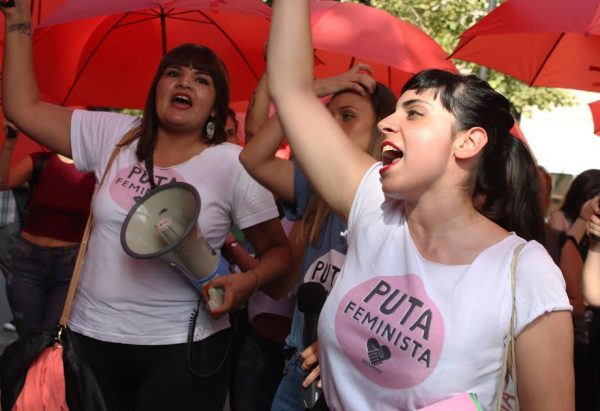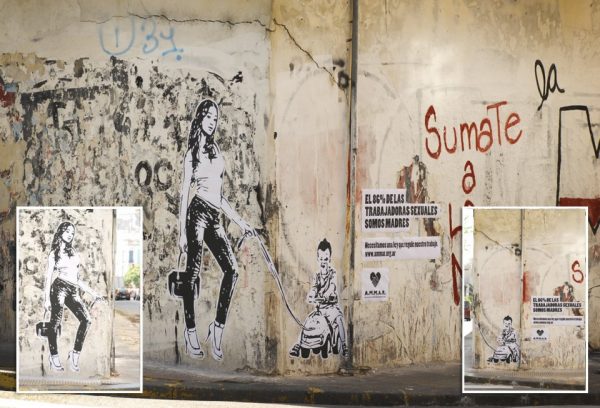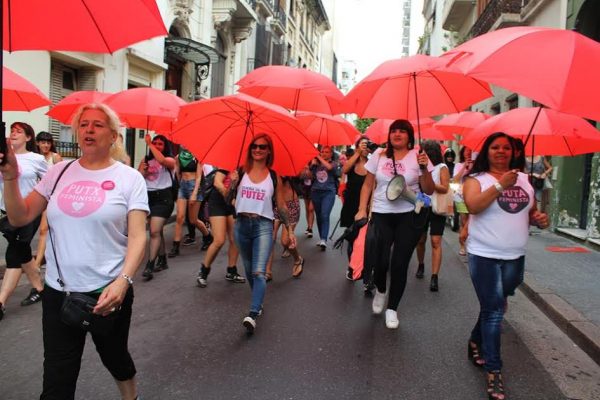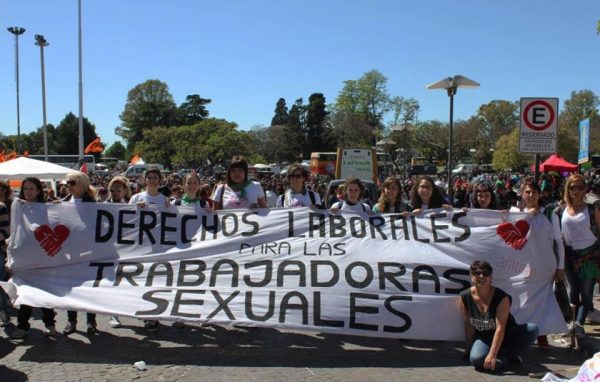
Maria Riot, a member of Argentine sex worker trade union AMMAR, contacted Tits and Sass after the Women’s Strike this month, eager to talk about how her organization participated in the event in their country. AMMAR has maintained a strong presence in Argentina for more than two decades, and its many bold campaigns have often made mainstream news internationally. I certainly had many questions saved up over the years to ask an AMMAR spokesperson.
Riot is a 25-year-old porn performer, sex worker, and activist who joined AMMAR a year ago, after three years not speaking publicly about her sex work. “Now I do,” she wrote to me. “I realize[d] only some [representatives] of AMMAR were talking in the media, and [we] needed more voices telling their experiences and doing activism, so I started doing it.” English is not Riot’s first language. Tits and Sass is presenting her answers to the interview questions below as written as faithfully as possible, in order to preserve her meaning.
Can you tell me about how AMMAR came to participate in protests on March 8th for the Women’s Strike? What sorts of reactions did you receive from local feminist organizers in response to your involvement?
AMMAR [has] a lot of presence in the women[‘s] rights movement. Since the last [few] years, we become really active at it so of course we participate in feminist events, marches, mobilizations, and debates. We believe that if we want women and feminism to listen to us, we have to be part of it and the most active we can [be].
In Argentina, we started organizing [for] the Women[‘s] Strike one month before it, in every city and province with assemblies where a lot of organizations participated. We did really intense and hard work because a lot of feminist[s] against sex work didn’t want us there. But the group that was organizing [the events] (Ni Una Menos) approved our asks to be part of the official document, so after lot of weeks of debates and discussions, we achieved having our voice in it and for the first time, our voice was [heard] on Women’s Day.
The fight was about the word “sex workers”: they wanted us to be “prostituted women” (that was [the language] in the document already), and we [spoke] up to have our identity and not the one they wanted to give to us. But the violence they used, calling us “pimps” and telling [us] that we don’t exist, made a lot of feminist[s] empathize and support us too. After all [that], [on the day of the strike], we participated with red umbrellas, lot of signs calling for a feminism that includes sex workers, and lot of women walking with us, and we [had] a lot of press and media reporting that it was the first time we officially were part of the 8th of March document and the [event].
You have been part of Argentinean Workers’ Central Trade Union since one year after the inception of your organization, in 1995. Internationally, sex workers often have trouble allying with traditional labor movements. Can you tell us how you’ve successfully maintained this alliance for decades?
AMMAR started in 1994, when sex workers working in the streets started to organize themselves to fight against the detentions and arrests [they] were facing just for working. They started [organizing] in the jail where they were arrested and then they started to [organize] in bars and restaurants near the places where they worked. When the police realized that, [they] started to arrest them [just for their political activity] and they were looking for them in the bars.
[So they were] [l]ooking for a place where they could do it without the presence of institutional violence, [and] a member from the CTA offered them a place. At the beginning it was not easy, mostly because of the opposition of women inside the union or others syndicates that were part of it, but the leadership of CTA gave them a big support because they wanted to include workers in the popular economy [and] workers that [didn’t have] their work recognized yet. It’s very important to be part of [the union] because without the government recognizing that our work is work yet, we [do have that acknowledgement] thanks to the Central Trade Union of Workers of Argentina, and that [creates] no place [for] debates about if our work is work or not.

In 2013, a memorable series of posters raising awareness on sex workers’ rights, which AMMAR hired prominent ad company Oglivy and Mather to design, came out and caused a lot of media attention. Can you tell me more about that collaboration and what you learned from it? That move definitely represented a very different approach to sex workers’ rights activism than we usually see, and I’m wondering if you’d advise other organizations to do anything similar.
In 2011, they came to AMMAR to help us, because of the prohibition of sex worker ads and the increasing confusion about sex work and trafficking (there was a statement launched by the feminists in the government [at the time] that [said] “Without clients there is no trafficking” for example, that [had] a big impact in [our] society). They realized the importance of the sex worker voice and they want[ed] to raise awareness about the problems that we were facing, so they created [these] stencils in the streets about sex workers being moms too and having to work to feed their children, [in contrast to] the popular imaginary about who the people working in the sex industry are.
The impact was great. Lot of people [were] taking photos of [the art] and posting [it] in social media and it was published in a lot of mainstream press like BBC London, because it was the first time they had seen a campaign for sex workers that was about being a mom working in prostitution.
What we learned [from] it was the importance of communication. We realized that breaking the stereotypes [about] sex workers was essential to end the stigma so we had to make our voices more visible, talking in first person and telling society our stories to fight the dehumanization that we have to [face] every day in the press and in politics, with laws made about us but not with us.
AMMAR spokespeople often cite the statistic that 86 percent of Argentine sex workers are mothers. How does that fact—and the fact that 93 percent of your members report that they are the sole providers for their families—affect your activism?
There are a lot of sex workers that can’t be really active in the activism because of the stigma and because they are the primary providers for their homes and families. Some of them ha[ve] more than one child, and the rent it is very expensive because we don’t have any papers to rent an apartment [on our] own—because of the fact that our job is not recognize[d] by the government and we can’t prove we are workers—so they usually live in a tiny hotel room with bad conditions. Georgina Orellano, the General Secretary of AMMAR, is a single mother and her son, that is 9 years [old], support[s] her and is always with us in the events and meetings, even talking and saying he want rights for sex workers so he can spend more time with his mom because of the hard work she does everyday. But a lot of sex workers have to hide their work [from] their own family because of the stigma, and that needs to change urgently.

AMMAR supports what seems like a legalization model—involving registry, licensing, health checks, and taxation, as well as pensions and benefits—rather than a New Zealand decriminalization model, the way the vast majority of peer-led sex workers’ rights groups do. Can you give me the rationale behind this stance?
There is an actual debate around this. The sex workers’ movement has grown, and now we have more evidence about what happen[s] with legalization and law[s] that regulate the sex industry. In 2013, when AMMAR [supported] a Law Project, it was because it was a strategy to show the media and the government that we existed and that we want rights, because [at the time], the Anti-Trafficking Law [had just passed], and everyone was talking for the prostitutes but not with them. Now [there is] no parliamentary [debate], and we are starting to have this discussions about what the sex workers from Argentina want.
We ask for decriminalization and for labor rights like any other worker, but we have to see how [to] do it and how we want it.
Argentina criminalizes third party management of sex work, as well as criminalizing sex worker advertisement since 2012. What can you tell us about how this abolitionist framework actually ends up criminalizing sex workers themselves, rather than achieving its stated aim of protecting them from exploitation?
Selling sex is legal in Argentina, but there are some practices that are criminalized on multiple levels: the “promotion” of prostitution (that it’s not really clear what it is [defined as], so having a website where you offer sexual services or giving a talk about how to be a sex worker can be criminalized), put[ting] ads in newspapers, working in the streets in 18 provinces of Argentina (where you can [be] arrested [for] even 60 days for that), or receiving money from someone else selling sex, something that lot of older sex workers do: they can’t access a retirement pension, so sometimes they work as secretaries of private apartments where voluntary prostitutes work. 45% of people that are in jail for trafficking and sexual exploitation are women, most of them sex workers in the past.
The Anti-trafficking Law and related initiatives fail to distinguish between consensual sex work and human trafficking, so all sex workers are potential victims. Now we are more marginalized than before because we have to work more clandestinely since the government closed places, such as apartments and clubs, so [a] lot of sex workers have to work in the streets where there is police violence. [For those who wish to learn more about this], I recommend the Amnesty document about the criminalization of sex work in Buenos Aires, which AMMAR contributed to with experiences and reports.

Tell us about your famous 2015 campaign to publicly bill journalist and politician sex worker clients for services. What reactions did you garner and what sort of effect did this campaign ultimately have?
The idea was created after thinking about how to communicate our demands. In the press, they always asked what laws we wanted and how. So we did a campaign with bills that showed how workers that are self employed [could] show the state how much are they earning, so they could make [tax] contributions to have medical [insurance] and to have the access of a retirement pension when we are older. We sent it to all the journalists, politicians, and allies with a press release explaining why we were sending them a symbolic bill. It was very controversial, and lot of them took [their] picture[s] with it. The campaign made a real difference, because it helped a lot to visibilize our activism and [we] even won a prize because of the communication strategy we used.
What are AMMAR’s most recent projects, and what are your goals right now for the organization?
One of the most important things for our activism was the appropriation of the word “puta”, “whore” in English. We started [calling] ourselves “Putas feministas” and now it has become our identity and how the people recognize us. Now everyone wants to have the t-shirt or the pin that says “Puta feminista”, and lot of feminists are changing their position about sex work, because they never had heard a sex worker [before]. We receive messages everyday of women telling us how our interviews, videos, or talks helped [them] to understand the complexity of sex work and how the the inclusion of us in feminism is necessary…Although there are a lot of feminist activists and groups that are against us, our voices are everyday more heard and lot of abolitionists are even changing their minds. We are definitely changing the narrative of sex work.
We have activities every week, sometimes every day. We are in our office from Monday to Friday where we do different things: some sex workers come to talk with us, tell [us] the problems they are having (mostly with the police and fines), we print fanzines and sell t-shirts to have money to pay [for] our resources, we receive students, filmmakers, or people interested in doing research or projects with us, and we do different itineraries giving condoms and information to sex workers that work in the streets. We do meetings every week to learn how to fight against institutional violence and how to organize better. Sex workers from Constitución, one of the most criminalizated places in Buenos Aires, launched a magazine telling their stories, and we had talks and videos going viral like a project with documentary videos with interviews called “Sex work in first person”. We do talks and debates in universities and different places, some of them with other precarized workers, because we believe that it’s important to be together fighting for our rights[…]
We have presence in nine provinces of Argentina […] We do interviews and write articles for different medias. Some of us are writing our first books and that is really important, because they are going to be the first books released by sex workers in the country. We participate in events like the Pride Parade and other feminist or social movement events or mobilizations, and we work together with academics that help us release studies, texts, and documents about our situation. For example, last year we released a document [on] evidence [of] the violence that sex workers suffer in the streets and in their own apartments where the police go, confiscate their things, and write down that they are “rescued victims.” We presented it in the national Congress.
We launched an app for mobile phones called PutySeñal that can be used for everyone, not only sex workers, for calling for help if you are being arrested or suffering institutional violence. [In the] [l]ast few months, [the] police are getting more power and there was a lot of events, even in the Women’s Strike, where women were arrested without doing anything. We used to have a group that works the same, but only for sex workers, but now that everyone is concerned about police violence, we thought it was important for all the society to know that sex workers deal with it everyday, so we can help. The app has numbers of lawyers and different NGOs that can help if you are in a detention or having a problem with the police, and it can be used without [a] signal, just [by] moving the phone in a determinant way.
This July 2nd, we are gonna do our first march of only sex workers. [A]nd we are being part of the Encuentro Nacional de Mujeres, a national meeting of women […], the most important [in] Argentina, where more than 70,000 women attend and where last year was the first time that sex workers had their own talks, because [in] the past years we were [only] included in [talks about] the “situation of prostituted women.”
We are excited to continue giving our voice and fighting for our rights, with everyday more organization, union, and support.

This is so great! Please do more pieces like this T&S.